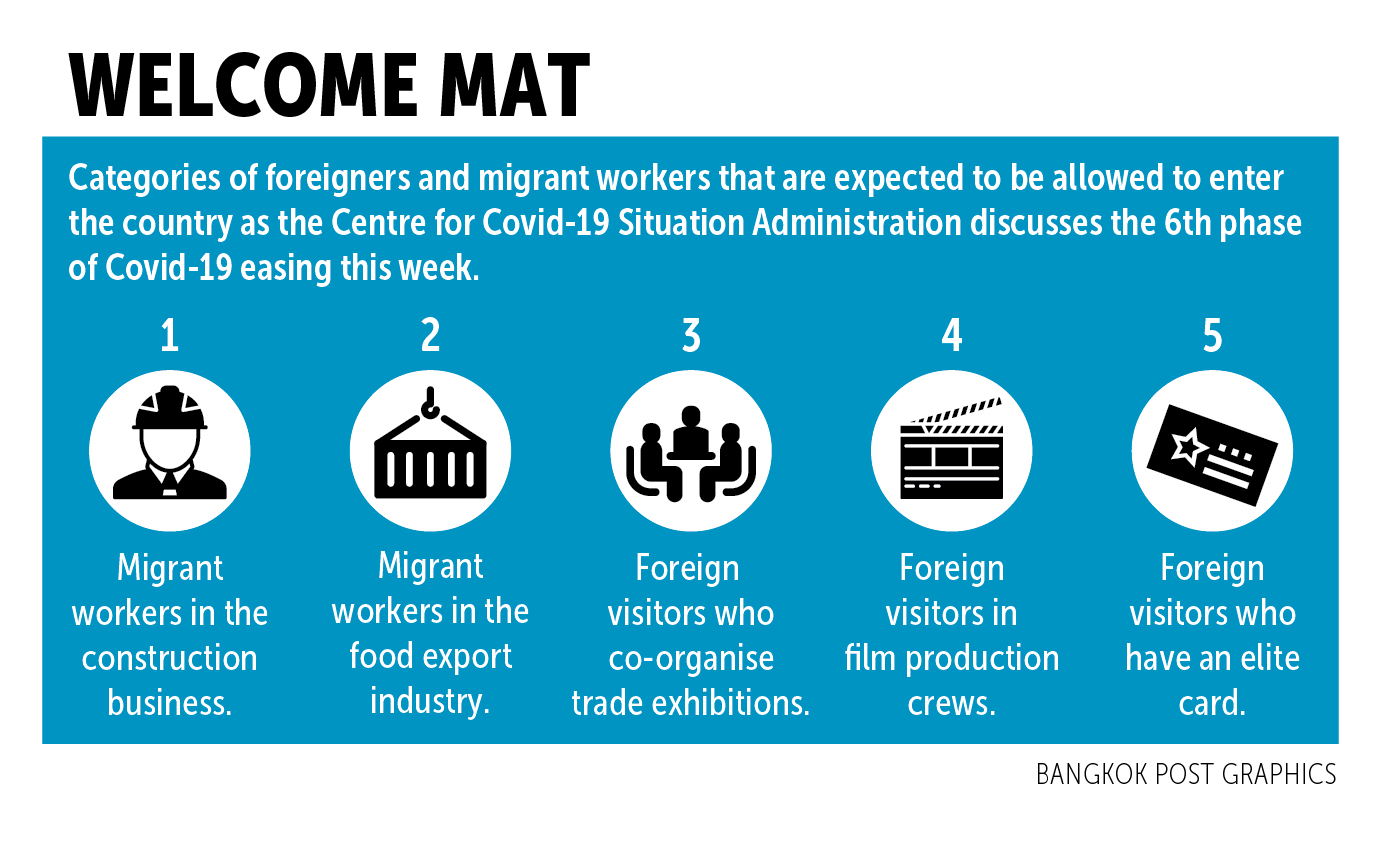
Five select groups of foreigners and migrant workers are expected to be allowed to enter the country as the Centre for Covid-19 Situation Administration (CCSA) will consider the 6th phase of Covid-19 easing this week.
However, although the country has been free of local transmissions for 55 days, an opinion survey issued yesterday showed that public sentiment was still against plans to open the doors to foreigners.
CCSA spokesman Taweesilp Visanuyothin said at a press briefing on Sunday that a committee assigned to consider the easing of Covid-19 restrictions has discussed the 6th phase of relaxation and the issue will be tabled to a full meeting of the CCSA this week.
The relaxation will cover migrant workers in the construction business and food export industry, foreign visitors who co-organise trade exhibitions, foreign visitors in film production crews, and foreign travellers who are members of the Thailand Elite Card scheme, Dr Taweesilp said.
He insisted the government still gives top priority to public health safety, while keeping the economy functioning is of secondary importance. Effective disease control measures will restore public confidence, he said.
He said checks by officials have found that operators of businesses that are in the "red" or high-risk category and which have been allowed to reopen have cooperated and complied with disease control guidelines to curb the spread of the disease.
Asked by reporters what factors are taken into account when considering whether to extend or lift the emergency decree, Dr Taweesilp said the CCSA's subcommittee will discuss every angle of the situation based on information on public health, the economic impact and national security.
The spokesman denied claims the government had allowed people infected with Covid-19 from abroad, including Thai returnees and foreigners, to enter the country for the purpose of deterring anti-government protests.
"The Mam Pho Dam Facebook page has claimed that a plot is under way to import infected people to trigger a second small wave of infections and extend the emergency decree to prevent student protests," Dr Taweesilp said.
The spokesperson said Thai returnees from abroad have been allowed back home so they can go about their businesses which in turn will help improve the economy affected by the pandemic, though the government has made it mandatory for them to be quarantined at facilities arranged by the state upon arrival first.
The regulations also apply to a select groups of foreigners who will be allowed to enter the country, Dr Taweesilp said.

Foreign Ministry spokesman Cherdkiat Atthakor said the ministry has been informed by the Thai embassy in Russia that 102 Thai labourers in Uzbekistan who want to return to Thailand were tested and all of them had come back negative for the disease.
Meanwhile, the Disease Control Department reported the latest test results amid public concern about a shopping trip in Rayong by an infected Egyptian military officer and the arrival of the daughter of a Sudanese diplomat who tested positive for the disease late last week.
Last Friday, 1,374 more people were tested in Rayong. Of them, 1,369 tested negative while the test results of the remaining five are still pending.
Overall, more than 5,000 people have tested negative so far which is proof that disease control measures carried out to curb the spread of Covid-19 infections following the two health scares have succeeded, according to the department.
A total of 364 people at the same condominium building as the diplomat's daughter before she was admitted to hospital also tested negative for the virus, according to the department.
Meanwhile, a vast majority of Thais -- 94.5% -- say foreigners should be barred from entering the country to prevent a second wave of the Covid-19 spread, according to an opinion survey by the Suan Dusit Rajabhat University or Suan Dusit Poll.
The poll was carried out online on July 14-18 among 1,459 people throughout the country to gauge their reactions to the cases of an Egyptian airman and a Sudanese girl found to be infected with Covid-19 after they were allowed to enter the country.
Asked how they felt after hearing about the two cases, 52.2% of respondents said they were very worried; 39.68% fairly worried; 6.58% slightly worried; and 1.5% not worried at all.
Asked to mention five things that would worry them if there were a new wave of the Covid-19 spread, with each respondent allowed to give more than one answer, 95.89% cited the degree to which the disease spread; 94.45% unemployment; 92% a shutdown of businesses; 84.1% their children's schooling; and 84.1% another lockdown announcement.
According to the survey, a large majority, 73.8%, thought the chance that Thailand would announce a second lockdown was high.